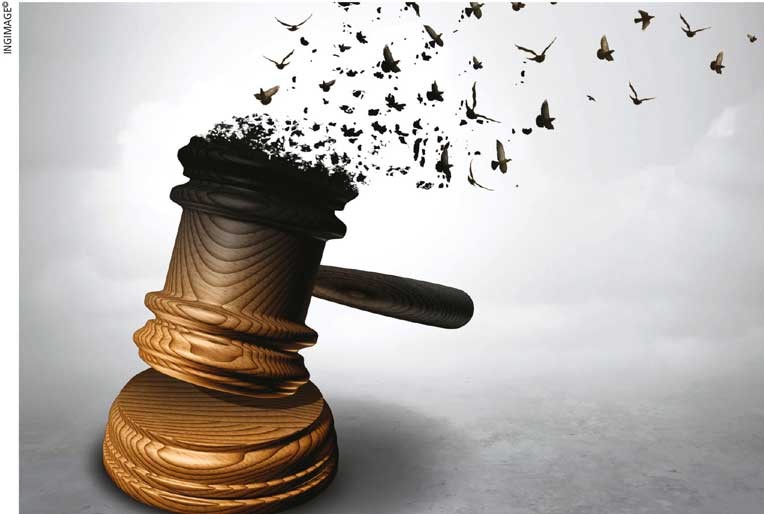POSTWAR RECONCILIATION
NEED FOR LONG-TERM PROCESSES
Dr. Jehan Perera emphasises the importance of unity among communities
The release of 16 long-term LTTE detainees from their prolonged imprisonment has been an exceptional event. The government’s ability to release them without generating controversy or protests is a positive indication of the potential for more developments in the postwar reconciliation process.
 That this occurred without any protest is a sign of the evolution of the Sri Lankan consciousness as much as an expression of trust and confidence in President Gotabaya Rajapaksa’s personality and colleagues.
That this occurred without any protest is a sign of the evolution of the Sri Lankan consciousness as much as an expression of trust and confidence in President Gotabaya Rajapaksa’s personality and colleagues.
Had any other government leadership signed a similar executive order and released LTTE suspects, there would have been an outcry from those same quarters that the country’s security was being compromised.
Those who spoke in parliament that day pointed out that at the root of these long-term detentions without trial is the Prevention of Terrorism Act (PTA), which is at the heart of a European Parliament resolution to deny Sri Lanka the GSP+ tariff concession
that is of great importance to the economy.
The PTA permits arrests without warrants and detention without the possibility of obtaining bail unless the government agrees to it. This law has been used not only in the case of LTTE suspects but during the Janatha Vimukthi Peramuna (JVP) insurrection and more recently, to incarcerate suspects in the aftermath of the April 2019 Easter Sunday bombings and those whose political views are critical of the incumbent government.
So the short debate that took place in parliament and set the stage for the LTTE detainees’ release is a symbol of how much has changed in Sri Lanka since the 1950s or even the end of the war in 2009. The quality of the debate was generally edifying.
Minister Namal Rajapaksa set the ball rolling by speaking with eloquence on his personal experience in prison where he saw the wastage of youth in those incarcerated for long years without trial or recourse to the judicial process.
It would be no exaggeration to say that the moment for transformation is now and needs to be seized to embark on a process of change – and not simply on a single event change.
It is significant that the government’s decision to show magnanimity has come following the passage of the EU resolution by 628 to 15 votes in the 705 seat parliament. The fact that the overwhelming majority of parliamentarians from 27 European countries voted in this manner is an eyeopener about the uphill task of changing the international community’s opinion on this matter.
This resolution is the latest of a series of four, which began with the UN Human Rights Council (UNHRC) resolution in March, followed by the ‘genocide bill’ passed by the Ontario parliament and resolution presented to the US Congress in May.
Apart from the significant erosion of global support that the EU parliament’s resolution indicates, the nature of the sanction may have jolted the government to take remedial action to prevent their escalation.
The UNHRC resolution set up a process of human rights monitoring and accountability with perhaps longer-term implications.
On the other hand, the EU resolution has the potential to immediately debilitate Sri Lanka’s economy by withdrawing the GSP+ concession. The government has experienced losing the facility in 2010; and the economy was weakened then too although it was in much better shape as the war had just ended and all economic indicators were set to rise.
We can be confident that our country has the moral and intellectual capacities to overcome past and present obstacles to true national development.
Wartime army commander General Sarath Fonseka’s unscripted response in parliament was particularly impressive and moving on account of its spontaneous moral quality.
Fonseka referred to the person who transported the suicide bomber whose attack almost killed him in 2016 as he continued to be imprisoned without his case being decided in court. And he stated that the LTTE member had been punished enough and requested his release.
Other parliamentarians whose names come to mind from that debate include
M. A. Sumanthiran, Rauff Hakeem, Gajendrakumar Ponnambalam and Shanakiya Rasamanickam. They displayed an understanding of the interconnected nature of law and politics, and the need to transcend the past – be it through the PTA reform or pardoning those who were fighters for a cause in a war that is over.
Together with the president and prime minister, they can jointly bring about a transformation in this long bloodied country in which unity among the communities must come first.




